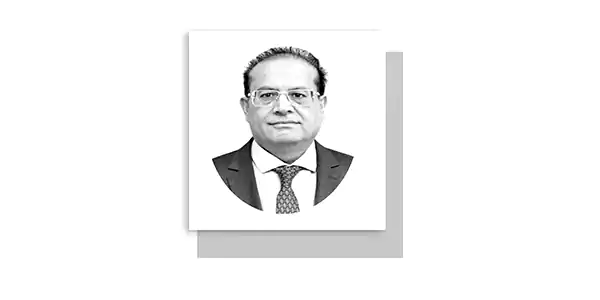IN an interview with a national TV channel, Rauf Hassan disclosed several key aspects of PTI’s policies and decisions on pressing issues. These included the party’s stance on bilateral relations between Saudi Arabia and Pakistan, their approach to the six judges’ charge sheet against the executive and intelligence agencies, their policy towards JUI, the return of the election symbol of PTI, the reintegration of deserted party members, the party’s perspective on internal divisions within PML(N), and the efforts to improve relations between PTI and the influential establishment.
I know Rauf Hassan from the date of his appointment as Special Assistant to the Prime Minister for the Ministry of Information. As Joint Secretary, I received and ushered him to his office. Though he was not very popular amongst the PTI’s political leadership of that time, following the removal of many frontline leaders after the crackdown on the party, he virtually emerged as PTI’s primary spokesperson, particularly in handling complex and challenging decisions.
While reacting to Sheer Jan Marwat’s statement on Saudi Arabia, he said that Imran Khan, was shocked to hear the unwarranted and obnoxious comments and narrated many instances where Saudi Arabia had rescued Pakistan from difficult financial, economic, and diplomatic situations. He advised the PTI’s core committee to meet with the Saudi Ambassador and explain to him the party’s stated position, emphasizing that the PTI greatly values the bilateral, fraternal, and brotherly relations with Saudi Arabia and that PTI had no intention to derail Saudi Arabia’s investment commitment in Pakistan.
He said that currently, a status quo exists between PTI and the Establishment and relations are icey without any sign of melting, and effectively poured cold water on assumption of IK’s release any time soon. He said after the Chairman’s arrest, there was great pressure on him to leave the country, and as soon as the conditions were made favorable, he would be called back. However, the chairman refused to succumb to any pressure whatsoever. He emphasized that the army, an important and vital institution of the country, already has its plate full owing to external and internal security and safety threats. Therefore, they should focus on their core functions and leave politics to the politicians and the people of Pakistan, who are the final authority to accept or reject any political leader.
While discussing the possibility of rapprochement with the JUI, he mentioned that within PTI there are two factions: one headed by Asad Qaiser in favor, and the rest of the party against such a proposal. He said that the history of animosity between JUI and PTI is very bitter, and it would perhaps take much more time and effort to mend fences and develop a consensus on relevant issues confronted by the nation.
Regarding the decision to take back party leaders who had deserted the party under immense pressure from the establishment, he clarified that the party is well aware about the hardships they had faced and therefore had made a clear distinction between those who left the party, gave derogatory statements against it, and joined other parties, and those who, though left the party, neither gave statements against the party nor joined another party. When specifically asked about Fawad Hussain, he categorically said that he falls in the first group while Malika Bukhari and Shireen Mazari fall in the second group.
Regarding Mian Nawaz Sharif’s decision to become a party to the Supreme Court’s suo motu proceedings on six judges’ letters, he said that in principle, PTI would stay away from any proceedings as it believes that the judiciary, as a pillar of the state, should be able to resolve the matter amongst themselves, and any outside interference or indulgence would be counterproductive. He added that without a strong, independent, free, and fair judiciary, the state cannot function properly, as is the case in Pakistan currently.
However, despite many policies of the PTI being unveiled, many burning questions remain. When and how will the Chairman of PTI’s ordeal finally end? Will he be breathing in fresh air any time soon? Without Imran Khan, will the movement kick started by the PTI and its allied parties in Balochistan, demanding the reissuance of election results on the basis of form 45 gain enough momentum to pose credible pressure on the government and the establishment to either reissue the election results, or decide to conduct fresh elections? Questions also remain about how effectively the incumbent government of PML(N) will deliver in coming months? .
.—The writer is former Press Secretary to President of Pakistan.










